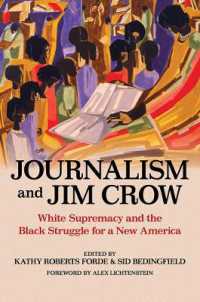- ホーム
- > 洋書
- > 英文書
- > History / World
基本説明
Drawing on the most recent research concerning the "continuity thesis," the chapters in this collection debate connections between German colonialist activities and the behavior of Germany during World War II.
Full Description
More than half a century before the mass executions of the Holocaust, Germany devastated the peoples of southwestern Africa. While colonialism might seem marginal to German history, new scholarship compares these acts to Nazi practices on the Eastern and Western fronts. With some of the most important essays from the past five years exploring the "continuity thesis," this anthology debates the links between German colonialist activities and the behavior of Germany during World War II. Some contributors argue the country's domination of southwestern Africa gave rise to perceptions of racial difference and superiority at home, building upon a nascent nationalism that blossomed into National Socialism and the Holocaust. Others remain skeptical and challenge the continuity thesis. The contributors also examine Germany's colonial past with debates over the country's identity and history and compare its colonial crimes with other European ventures. Other issues explored include the denial or marginalization of German genocide and the place of colonialism and the Holocaust within German and Israeli postwar relations.
Contents
Acknowledgments Introduction: Reconfiguring German Colonialism, by Volker Langbehn and Mohammad Salama Part I. Colonial (Dis)Continuities: Framing the Issue 1. Borrowed Light: Nietzsche and the Colonies, by Timothy Brennan 2. German Colonialism: Some Reflections on Reassessments, Specificities, and Constellations, by Birthe Kundrus Part II. Lebensraum and Genocide 3. Against "Human Diversity as Such": Lebensraum and Genocide in the Third Reich, by Shelley Baranowski 4. Hannah Arendt, Imperialisms, and the Holocaust, by A. Dirk Moses 5. Caesura, Continuity, and Myth: The Stakes of Tethering the Holocaust to German Colonial Theory, by Kitty Millet Part III. Looking East: Poland, the Ottoman Empire, and Politicized Jihadism 6. Germany's Adventures in the Orient: A History of Ambivalent Semicolonial Entanglements, by Malte Fuhrmann 7. Arguing the Case for a Colonial Poland, by Kristin Kopp 8. Colonialism, and No End: The Other Continuity Theses, by Russell A. Berman Part IV. Of Missionaries, Economics, and Intranational Self-Perception 9. The Purpose of German Colonialism, or, the Long Shadow of Bismarck's Colonial Policy, by Hartmut Pogge von Strandmann 10. Christian Missionary Societies in the German Colonies, 1884/85-1914/15, by Ulrich van der Heyden 11. German Colonialism and the British Neighbor in Africa Before 1914: Self-Definitions, Lines of Demarcation, and Cooperation, by Ulrike Lindner Part V. Postcolonial German Politics 12. "Kalashnikovs, Not Coca-Cola, Bring Self-Determination to Angola": The Two Germanys, Lusophone Africa, and the Rhetoric of Colonial Difference, by Luis Madureira 13. Germany, Palestine, Israel, and the (Post)Colonial Imagination, by Martin Braach-Maksvytis List of Contributors Index








